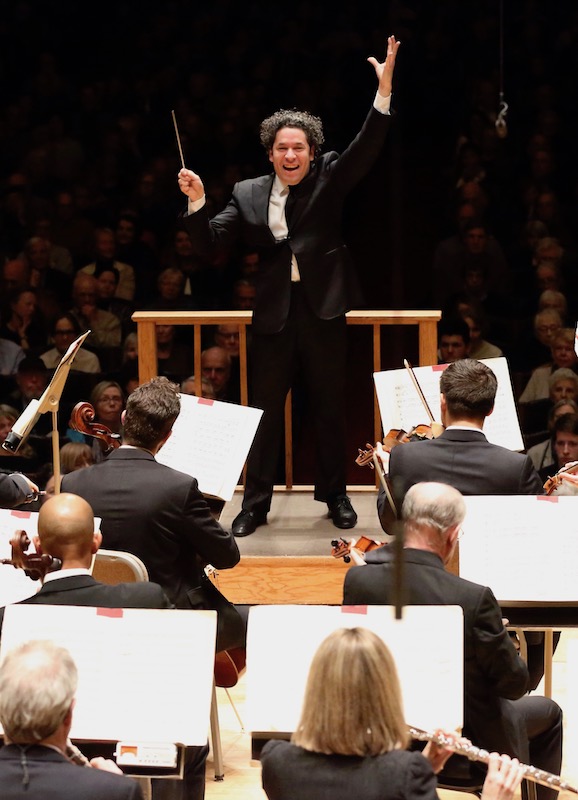Dudamel, BSO greet spring with violent Stravinsky, vernal Schumann
Even today, Stravinsky’s Rite of Spring fires the imagination. The late British composer John Ireland, an admirer of his younger Russian contemporary, once remarked that the music for this shocking ballet has “the power of calling something from the subconscious mind—some racial memory perhaps of things long hidden and belonging to a remote and forgotten past.”
Conductor Gustavo Dudamel has a firm feel for the visceral world wrought by Stravinsky’s stark, propulsive work. Leading the Rite of Spring from memory with the Boston Symphony Orchestra at Symphony Hall Friday afternoon, Dudamel revealed all the music’s pent-up violence and haunting mystery to remind listeners why the infamous score remains such a transformative musical experience.
Though overtly brash, the Rite of Spring bears the hallmarks of its romantic roots through the use of a large, colorful orchestra. Leading with brisk gestures, Dudamel conjured all the intimate details of the music without sacrificing momentum. Tempos were swift, though he lingered in the soft sections to bring eerie moments of repose.
Richard Svoboda’s opening bassoon solo unfolded freely, the plaintive line sounding like a voice from some misty past. Then, as English hornist Robert Sheena and oboist John Ferrillo added their own bold layers to the mix, the music swelled to an almost incessant chatter.
Throughout, Dudamel led with a confident sense of direction, treating Stravinsky’s mosaic-like structures as episodes in a long narrative. The grinding, accented dissonances of “Dance of the Young Girls” pulsed vigorously. The conductor pushed the tempo in “Mock Abduction” to bring additional crash-and-bang intensity before relaxing the pace in “Spring Round,” where clarinet and flute conveyed an uneasy calm.
Stravinsky’s music is ultimately an expression of exactly that: an unnerving, provisional serenity. The second part of the ballet score proceeded accordingly, its account of the sacrifice of a young girl evoking a disturbing sense of the unknown, as Dudamel drew attention to passing melodic wisps and serpentine phrases.
Stravinsky believed spring to be a season marked by violent reawakening of the earth from cold slumber. Dudamel’s renditions of “Dance of the Earth” and final “Sacrificial Dance,” with their quick-changing meters and agitated energy, seemed boisterous expressions of both life and death.
Schumann’s Symphony No. 1, which Dudamel led in the concert’s first half, also captured a sense of vernal excitement.
According to his wife Clara, Schumann originally scored his First Symphony to reflect a nature poem by Adolf Böttger. And though he later removed the descriptive titles from each movement, the composer retained the symphony’s subtitle, “Spring.” The work indeed teems with vitality, its flowering melodies and orchestral exuberance a fine fit for a more romantic view of the season.
To this day, Schumann is criticized for his thick, often unbalanced orchestrations. But Dudamel took care to highlight hidden wind phrases and French horn passages that are often buried in the composer’s organ-like sonorities and compact textures.
Friday’s performance delivered every dramatic contrast laden within this sparkling score. In the introduction, Dudamel called attention to each brass and percussion attack while settling into a congenial flow for woodwind and string responses. The first movement coursed vibrantly; the second offered subtle, songlike complement.
The finale took a Mendelssohnian grace and elfin crispness, with the strings shading the recurring theme with lush, amber tone. The Scherzo and its two Trios brought rustic verve. Through Dudamel’s vision, Schumann offered his own dance of the earth.
The program will be repeated 8 p.m. Saturday and Tuesday at Symphony Hall. bso.org; 888-266-1200
Posted in Performances





